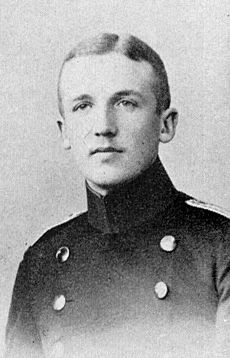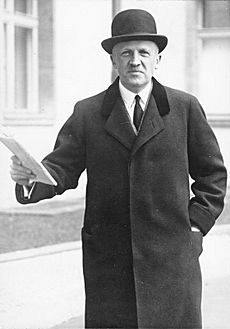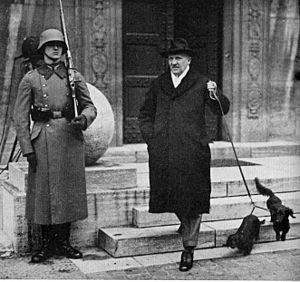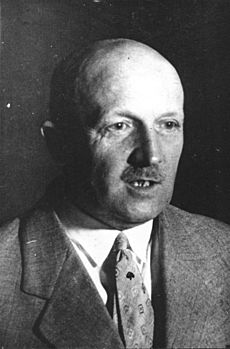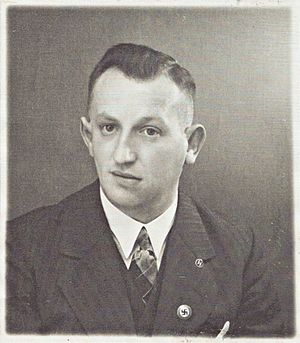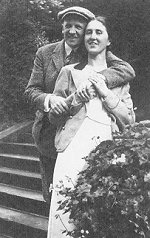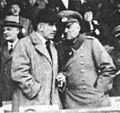Kurt von Schleicher facts for kids
Quick facts for kids
Kurt von Schleicher
|
|
|---|---|
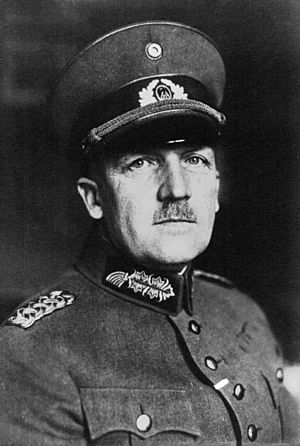
Schleicher in 1932
|
|
| Chancellor of Germany (Weimar Republic) |
|
| In office 3 December 1932 – 28 January 1933 |
|
| President | Paul von Hindenburg |
| Preceded by | Franz von Papen |
| Succeeded by | Adolf Hitler |
| Reichskommissar of Prussia | |
| In office 3 December 1932 – 28 January 1933 |
|
| Preceded by | Franz von Papen |
| Succeeded by | Franz von Papen |
| Minister of Defence | |
| In office 1 June 1932 – 28 January 1933 |
|
| Chancellor | Franz von Papen Himself |
| Preceded by | Wilhelm Groener |
| Succeeded by | Werner von Blomberg |
| Personal details | |
| Born |
Kurt Ferdinand Friedrich Hermann von Schleicher
7 April 1882 Brandenburg an der Havel, German Empire |
| Died | 30 June 1934 (aged 52) Potsdam-Babelsberg, Nazi Germany |
| Spouse(s) |
Elisabeth von Schleicher
(m. 1931) |
| Alma mater | Prussian Military Academy |
| Occupation |
|
| Military service | |
| Allegiance | |
| Branch/service | Imperial German Army Reichsheer |
| Years of service | 1900–1932 |
| Rank | General der Infanterie |
| Battles/wars | World War I
|
Kurt Ferdinand Friedrich Hermann von Schleicher (born April 7, 1882 – died June 30, 1934) was a German general. He was the last Chancellor of Germany before Adolf Hitler during the Weimar Republic. Schleicher was a powerful figure who competed with Hitler for control. He was later killed by Hitler's SS during the Night of the Long Knives in 1934.
Schleicher was born into a military family in Brandenburg an der Havel. He joined the Prussian Army as a lieutenant in 1900. He became a high-ranking officer in the German General Staff. During World War I, he served in the Supreme Army Command. After the war, he helped the Army connect with the new Weimar Republic. Schleicher was important in helping the German army, called the Reichswehr, avoid the rules of the Treaty of Versailles. He became a close advisor to President Paul von Hindenburg starting in 1926.
In 1932, Schleicher became the Minister of Defence. He then worked to remove Franz von Papen from power and became Chancellor himself on December 3. During his short time as Chancellor, Schleicher tried to make the Nazi Party cooperate with his government. He also tried to get a Nazi leader named Gregor Strasser to leave the party. But his plans did not work. Hitler refused to give up his demand to be Chancellor. Schleicher then asked President Hindenburg to rule as a dictator, but Hindenburg said no.
On January 28, 1933, Schleicher resigned because of political problems and his poor health. He suggested that Hitler be appointed as the next Chancellor. Schleicher later tried to get back into politics by using disagreements between Ernst Röhm and Hitler. However, on June 30, 1934, he and his wife Elisabeth were murdered by Hitler's orders during the Night of the Long Knives.
Contents
Early Life and Military Career
Kurt von Schleicher was born in Brandenburg an der Havel on April 7, 1882. His father, Hermann Friedrich Ferdinand von Schleicher, was a Prussian officer. His mother, Magdalena Heyn, came from a wealthy family.
From 1896 to 1900, he studied at the Hauptkadettenanstalt, a military academy. He became a second lieutenant in 1900. There, he became friends with other young officers like Oskar von Hindenburg and Erich von Manstein. He was promoted to first lieutenant in 1909. He then went to the Prussian Military Academy, where he met Franz von Papen. After graduating in 1913, he joined the German General Staff. He was promoted to Captain in December 1913.
World War I Service
When World War I began, Schleicher joined the General Staff at the Supreme Army Command. He served on the Eastern Front as Chief of Staff of the 237th Division in 1917. This was his only time serving on the front lines. He spent the rest of the war at the Supreme Army Command. He was promoted to Major in 1918.
After Germany's war effort collapsed, his mentor, Wilhelm Groener, took command of the German Army. Schleicher became a key link between the military and the government.
After World War I: Shaping the Army
German Revolution and Army's Role
After the November Revolution in 1918, the German military was in a difficult position. Schleicher played a big part in talks between the army and the new government. He helped make sure the army could keep its independence. This meant the military could act almost like a "state within the state."
To fight against left-wing rebels, Schleicher helped create the Freikorps in 1919. For the rest of the Weimar Republic, Schleicher worked to protect the military's interests in politics.
Secret Military Activities
In the early 1920s, Schleicher became a close helper of General Hans von Seeckt. Seeckt created a secret group called Sondergruppe R. This group worked with the Soviet Union to help Germany secretly rearm. Germany provided money and technology to the Soviet arms industry. In return, the Soviets helped Germany get around the disarmament rules of the Treaty of Versailles.
Schleicher also helped create secret military groups known as the "Black Reichswehr." These groups allowed Germany to have more soldiers than the Versailles Treaty allowed. These groups were known for dealing with people they thought were traitors. Schleicher always denied the army's connection to these secret groups in public.
Rising Political Influence
Schleicher steadily moved up in the Reichswehr. He became the main link between the army and government officials. He was promoted to Lieutenant Colonel in 1924 and Colonel in 1926. In 1929, he became a Major General. Schleicher preferred to work behind the scenes. He would share information with friendly newspapers and gather details from his contacts in the government.
When Groener became Defence Minister in 1928, Schleicher's career advanced greatly. Groener created a new office called the Ministeramt for Schleicher. This office was supposed to handle matters between the army and navy, and between the military and politicians. Schleicher used this office to increase the Reichswehr's influence in politics. He became the head of this office in 1929.
Schleicher and Groener were worried about the results of the 1928 German federal election. They felt that democracy was a problem for military power. They believed that only a strong government could make Germany a great military power again. Schleicher also gained the right to speak directly with President Hindenburg about political and military issues.
Presidential Governments
Schleicher suggested to President Hindenburg that he should appoint a government he trusted, without needing Parliament's approval. This idea was based on three articles of the Weimar Constitution. These articles allowed the President to dissolve Parliament, pass emergency laws, and appoint the Chancellor. Schleicher's plan was to have Hindenburg appoint a Chancellor who would rule using emergency powers. If Parliament tried to stop these laws, Hindenburg could threaten to dissolve Parliament.
In 1930, Schleicher helped bring down the government of Hermann Müller. He then helped appoint Heinrich Brüning as Chancellor. This began a period of "presidential governments." These governments became more authoritarian and less democratic over time.
Army's Social Role and Nazi Connections
Schleicher believed the army had a role in uniting society. He also thought that the SA (the Nazi Party's paramilitary group) could be used to help the army. From 1930, Schleicher secretly met with Ernst Röhm, the leader of the SA. They became good friends.
In 1931, Schleicher changed the rules to allow Nazis to work in military depots. Before this, military members were not allowed to join political parties. Schleicher and Röhm even made a secret agreement. If there was a war or a communist uprising, the SA would join the army.
Schleicher believed that only a dictatorship could make Germany strong again. He wanted to create a "Military State" where the military would organize German society. He thought the Nazis could be "tamed" by bringing them into the government. He admired the Nazis' military style.
Schleicher became a key figure in Brüning's government. He was an aide to Groener, the Minister of Defense. But Schleicher later caused problems for Brüning and Groener. His actions led to their downfall in May 1932.
The 1932 Presidential Election
Schleicher saw the Nazis as a strong force that could attract voters. He planned to get Nazi support for a new right-wing government. He then hoped to control the Nazis by using disagreements among their leaders. He also wanted to bring the SA into the army. Schleicher became convinced that he was the "strong man" Germany needed.
Brüning had banned the SA and SS because of political violence. This upset Schleicher's plans to work with the Nazis. Schleicher then started spreading rumors about Groener and Brüning to discredit them. He even claimed that Groener was a secret Social Democrat.
In May 1932, Schleicher promised Hitler that he would dissolve Parliament and lift the ban on the SA and SS. In return, Hitler would support a new government. After this, Schleicher told Groener that he had lost the army's trust, and Groener resigned.
Papen's Government
On May 30, 1932, President Hindenburg fired Brüning and appointed Franz von Papen as Chancellor. Schleicher had chosen Papen because he thought he could control him from behind the scenes. However, Schleicher's actions also made the army more involved in politics.
Schleicher became the Minister of Defense in Papen's government. He had chosen all the cabinet members himself. The new government immediately dissolved Parliament and lifted the ban on the SA and SS. This encouraged more political violence.
Schleicher and Papen also worked to remove the Social Democratic government of Prussia. Schleicher created false evidence that the Prussian police were favoring communists. He used this to get an emergency order from Hindenburg to take control of Prussia. On July 20, 1932, the army took over the Prussian government without any fighting.
In the July 1932 election, the Nazi Party became the largest party. In August, Hitler broke his agreement with Schleicher. Instead of supporting Papen, Hitler demanded to be Chancellor. Schleicher was willing to agree, but Hindenburg refused. This caused Schleicher's influence with Hindenburg to weaken.
Papen's government was defeated in Parliament in September 1932. Another election was held in November, and the Nazi Party lost some seats but remained the largest. Papen became more independent than Schleicher expected. This led to a growing disagreement between them. Schleicher brought down Papen's government on December 3, 1932. He used a fake report that showed the army could not control paramilitary groups if martial law was declared. This forced Papen to resign, and Schleicher became Chancellor. Papen became very angry with Schleicher for this.
Schleicher's Chancellorship
Schleicher hoped to get the Nazis' support for his government. By late 1932, the Nazi Party was struggling financially and had internal conflicts. Schleicher believed the Nazis would eventually have to support him because he was the only one who could offer them power.
To gain Nazi support, Schleicher talked about forming a "cross-front" (Querfront). This was a plan to unite different groups in Germany under an authoritarian government. He hoped this would force Hitler to support his government. Schleicher was not serious about this plan; it was a bluff to pressure the Nazis. He tried to reach out to labor unions and the left-wing part of the Nazi Party led by Gregor Strasser.
On December 4, 1932, Schleicher met with Strasser. He offered to make Strasser the new Minister-President of Prussia. Schleicher hoped this would cause a split in the Nazi Party, forcing Hitler to cooperate. But Hitler stopped Strasser and kept the party united.
One of Schleicher's main plans was a public works program to fight the Great Depression. This program aimed to create 2 million jobs by July 1933. These projects are often mistakenly linked to Hitler, but they were Schleicher's idea.
Schleicher's relationships with his cabinet members were poor because he was secretive and often showed disrespect. He kept most of Papen's unpopular cabinet, which made his own government unpopular. Schleicher also made a joke about Major Oskar von Hindenburg, which offended him and reduced Schleicher's access to President Hindenburg.
In foreign policy, Schleicher wanted Germany to have "equality of status" at the World Disarmament Conference. This would remove the disarmament rules from the Treaty of Versailles. He tried to improve relations with France. He hoped this would lead France to end its alliance with Poland, allowing Germany to divide Poland with the Soviet Union. In January 1933, Schleicher announced plans to bring back conscription and allow Germany to have all forbidden weapons by 1934.
Political Mistakes and Downfall
On January 20, 1933, Schleicher missed a chance to save his government. A Nazi leader suggested that Parliament take a long break. If this had happened, Schleicher's public works projects would have started to show results, and Nazi internal conflicts might have worsened. But Schleicher wanted a shorter break, which meant Parliament would reconvene sooner.
Papen, who hated Schleicher, had President Hindenburg's ear. Papen advised Hindenburg to appoint Hitler as Chancellor in a coalition with the Nationalist Party. Papen believed they could control Hitler. Papen held secret meetings with Hitler and Hindenburg. Hindenburg then refused Schleicher's request for emergency powers and to dissolve Parliament again. Schleicher did not believe for a long time that Papen was trying to bring him down.
Because Schleicher had made everything depend on President Hindenburg's decisions, he was in a very weak position when Hindenburg turned against him. By January 1933, Schleicher was distrusted by almost everyone because of his history of intriguing against friends and enemies.
On January 28, 1933, Schleicher told his cabinet he needed a decree from the President to dissolve Parliament. Otherwise, his government would likely be defeated. He asked Hindenburg for the decree, but was refused. Schleicher then announced his resignation. He thought Papen would be his successor.
On January 29, Werner von Blomberg was sworn in as Defense Minister. At this point, the military, which had been Schleicher's main support, withdrew its backing. They saw the Nazis as the only ones who could gain popular support for a strong military state. Most senior army officers advised Hindenburg that Schleicher needed to go.
Supporting Hitler's Chancellorship
That same day, Schleicher learned his government was about to fall. Fearing that Papen would become Chancellor, Schleicher began to favor Hitler for the position. He knew he had no chance of being Defense Minister under Papen, but thought his chances were good under Hitler.
Hitler was initially open to Schleicher as Defense Minister. However, a meeting with one of Schleicher's associates made Hitler believe Schleicher was planning a coup. With rumors spreading that Schleicher was moving troops into Berlin, Papen convinced Hindenburg to appoint Hitler as Chancellor the next day. On January 30, 1933, Hindenburg dismissed Schleicher and appointed Hitler. In the following months, the Nazis turned Germany into a dictatorship.
Assassination
Schleicher's enemy, Werner von Blomberg, became the new Defense Minister. Blomberg quickly removed officers connected to Schleicher. This included Ferdinand von Bredow and Eugen Ott. General Kurt von Hammerstein-Equord, a close friend of Schleicher, resigned in 1934. With these changes, Schleicher's supporters were removed from the army's high command, taking away his remaining power.
In the spring of 1934, Schleicher heard about growing disagreements between Ernst Röhm and Hitler. Schleicher started getting involved in politics again. He criticized Hitler's government. Some of Schleicher's followers even suggested a new government where Schleicher would be vice-chancellor and Röhm would be defense minister. Schleicher believed he could help solve the dispute between Röhm and the military. He hoped Hitler would fire Blomberg and give him back his old job as Defense Minister.
Hitler had considered killing Schleicher for some time. On June 30, 1934, during the Night of the Long Knives, Schleicher became one of the main victims. Around 10:30 AM, men in trench coats arrived at Schleicher's home. While Schleicher was on the phone, he heard a knock. His last words, heard by his friend on the phone, were "Yes, I am General von Schleicher." Then, two shots were fired. His wife, Elisabeth von Schleicher, ran into the lobby and was also shot and killed.
Funeral and Aftermath
At Schleicher's funeral, his friend von Hammerstein was not allowed to attend by the SS. The SS also took away wreaths from mourners. Hammerstein and Generalfeldmarschall August von Mackensen worked to clear Schleicher's name. The army managed to get Schleicher's file from the SS. Mackensen led a meeting of officers who toasted Schleicher and added his name to the regimental honor roll.
On July 13, Hitler gave a speech to Parliament, saying he had killed Schleicher for plotting with Röhm to overthrow the government. Hitler claimed both were traitors working for France. Because Schleicher was friends with the French ambassador, André François-Poncet, and had a reputation for political scheming, many Germans believed this claim, even though it was false. François-Poncet remained the French ambassador in Berlin, which showed that Hitler's claim was not true.
The army's efforts to clear Schleicher's name were successful. In 1935, Werner von Fritsch and Werner von Blomberg pressured Hitler to restore Schleicher's reputation. They argued that officers could not stand the press attacks calling Schleicher a traitor. On January 3, 1935, Hitler stated that Schleicher had been shot "by mistake" and that his name should be restored to his regiment's honor roll.
These remarks were not published in German newspapers. However, Generalfeldmarschall von Mackensen announced Schleicher's rehabilitation at a public meeting of General Staff officers. For the army, the matter of Schleicher's murder was considered settled. Privately, the Nazis continued to accuse Schleicher of treason.
When the former German Emperor Wilhelm II heard about the assassination, he said that Germany was no longer under the rule of law.
Images for kids
See also
 In Spanish: Kurt von Schleicher para niños
In Spanish: Kurt von Schleicher para niños
 | Roy Wilkins |
 | John Lewis |
 | Linda Carol Brown |


